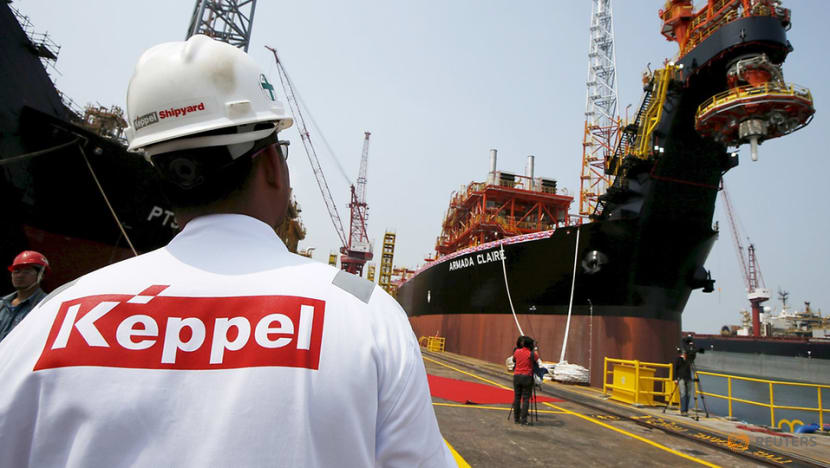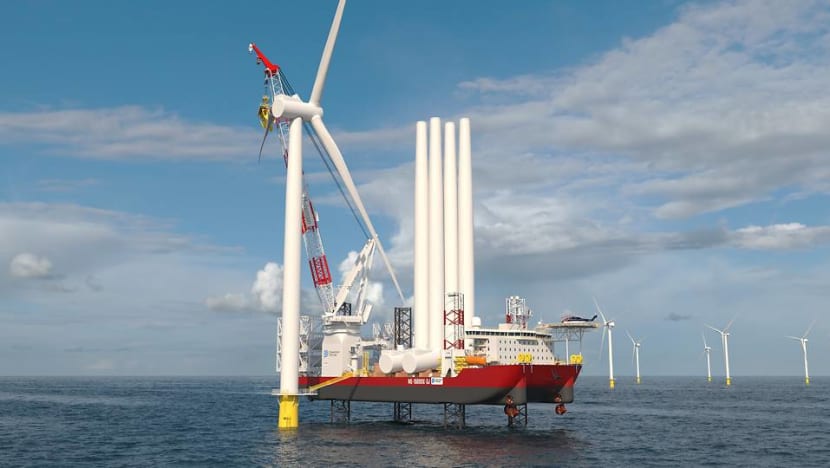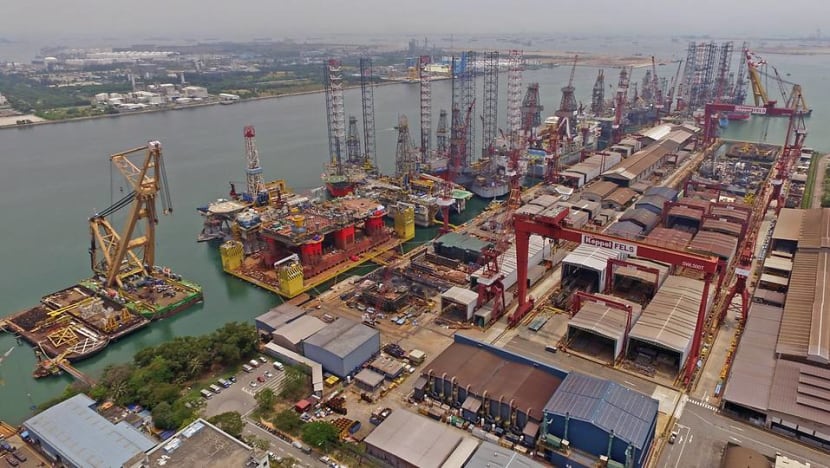commentary Commentary
Commentary: Keppel’s exit of rig business may have bigger implications for Singapore's offshore and marine sector
The world’s largest rig-builder’s decision shouldn’t come as a surprise though, says David Kuo, as the sun has been slowly setting on a shrinking oil and gas industry.

A worker passes a vessel modified and upgraded by Keppel Shipyard. (File photo: Reuters)
SINGAPORE: On Jan 28, the world’s largest rig-builder, Singapore-based Keppel Corporation surprised industry players and observers when it announced exiting away from its rig business to pivot to clean energy.
As a result of a long-awaited strategic review, Keppel’s chief executive Loh Chin Hua revealed in the group’s results briefing on Jan 28 that the group will transform its offshore and marine (O&M) unit into “a nimble, asset-light and people-light Operating Company (Op Co)".
However, Keppel Corp’s decision to withdraw gracefully from the oil and gas sector shouldn’t have come as a great surprise to anyone.

After all, the sun has been slowly setting on a shrinking oil and gas industry. COVID-19 has merely focussed a spotlight on oil’s unavoidable demise.
As Mr Loh explained: “The energy transition is upon us and has accelerated. The headwinds we face in the O&M industry is intense... critical.”
According to the International Energy Agency, conventional crude oil production is close to reaching a peak. It concluded that peak oil, which refers to the point of maximum production, could happen by 2030 or 2040.
READ: In The New Map, author Daniel Yergin takes on energy, climate change and the slow but sure shifts in big power relationships
Peak oil doesn’t mean, as some mistakenly think, that oil has been totally depleted.
According to the US Energy Information Administration, there is enough liquid hydrocarbons to adequately meet the world’s demand for liquid fuel through 2050.
NOT QUITE THE END OF BIG OIL
As alternatives to fossil fuel becomes more attractive, the shift from big oil has become more pronounced.
For instance, the world’s largest asset manager BlackRock, with nearly US$7 trillion in investments, has said that it will consciously make investment decisions with environmental sustainability as a core.
Elsewhere, US President Joe Biden has just recently dealt a huge blow to the US fossil fuel industry by cancelling the Keystone pipeline project with Canada.
Even Norway’s sovereign wealth fund, which was built through its windfall from oil, has said that it will gradually sell off its US$8 billion stake in oil and gas firms.
However, it stressed that this will not affect the fund’s stake in Norway’s state oil and gas firm, Equinor. It will also not affect the country’s ongoing plans to explore and pump more oil from its surrounding waters.
READ: Commentary: Is there a fairer way to help emerging markets decarbonise?
READ: Commentary: Besides talking about responsibility, global collective climate action should also be a focus
That is telling. It suggests that demand for oil is not about to evaporate. BP, for instance, has predicted that demand for oil will recover.
But it cautioned that it is unlikely to recover to pre-pandemic levels due to increased proliferation of electric vehicles and stronger action on climate change.

Thing is, many industries are still heavily dependent on oil. These include the airline industry, the farming sector and industrial systems that rely not only on the low cost of oil, but the fact that oil is also readily available.
From Keppel Corp’s perspective, an industry in decline simply means that the sector has reached a level of maturity where many established players are experiencing a slowdown, if not a total absence, of organic growth.
But declining industries can still be profitable for well-positioned players.
CONSOLIDATION IN SINGAPORE’S O&M SECTOR
Keppel Corp could look for complementary industries where it could be easier to compete. Meanwhile, its subsidiary, Keppel O&M, which is the world’s largest offshore rig builder, could be well-positioned to capitalise on the remaining demand for crude.
But to do so, it may be necessary for Keppel to hive off its uneconomic rig assets from the parts that show promise, such as green energy and renewables. It is doing precisely that by dividing Keppel O&M into three discrete parts.
READ: Commentary: Big oil and coal exporters face reckoning as Paris Agreement turns five
READ: Commentary: Singapore's Tuas Mega Port a bold investment that will face significant challenges
The three entities are Rig Co and Development (Dev) Co, which are transient companies, and Operating (Op) Co that is intended to be an asset-light and people-light operating company.
Op Co will focus on the growing areas of renewables and gas solutions, which should dovetail into Keppel Corp’s Vision 2030 of generating a return on equity of 15 per cent.
This doesn’t necessarily spell the end of the road for either Rig Co and Dev Co, which will hold the completed and uncompleted rigs, respectively. But it does suggest that neither unit would fit into Keppel’s strategy.
That said, it could put both transition companies into pole position to trigger much-needed consolidation within the industry.
A prime candidate for a merger is another Singapore company, Sembcorp Marine, which was recently fully de-merged from its parent Sembcorp Industries.

A combination of the two is looking more likely, rather than less, now that Keppel Corp has completed its strategic review.
In its latest full-year results, Keppel’s Offshore & Marine division confessed to an operating loss of S$909.6 million on revenue of S$1.57 billion.
Sembcorp Marine has yet to report full-year numbers for 2020. But in its most recent full-year report, it also reported a deficit. It posted an operating loss of S$138.8 million on revenue of S$2.88 billion.
It is bewildering that two separate companies that are operating in a similar space can generate combined losses of over S$1 billion on total revenue of more than S$4.3 billion.
One possible explanation is that the two companies are eating each other’s dinner. They are competing for the same projects based on price rather from positions of strength.
That is understandable for that to happen in a shrinking market. But it is nevertheless unacceptable. It could jeopardise their long-term survival.
A WIN-WIN FOR EVERYONE
A logical solution would be a merger of Keppel Corp’s Rig Co and Dev Co with Sembcorp Marine. It would eliminate the need to compete for contracts purely on price.
READ: Commentary: China will bet big on clean energy to achieve carbon neutrality
READ: Making shipping cleaner - is LNG the answer?
Instead, it could allow the enlarged entity to bid only for profitable projects, even in a market that is shrinking. As the saying goes: Revenue is vanity, profit is sanity, cash is reality, everything else is pomposity.
From a strategic angle, it would make sense. From a human resources angle, it might not only safeguard jobs but could even boost employment. A dominant player, even in a shrinking market, has pricing power.
Already, during the group’s results briefing last week, Mr Loh hinted that the move away from rig-building may mean a more streamlined yard operations and workforce. “We don't need the (yards) footprint as we have today. There is a possibility to repurpose.”

So, the merger of Rig Co and Dev Co with Sembcorp Marine could help minimise any headcount reduction in the yards overall. A larger, consolidated rig-builder could reap great economies of scale and maintain and warrant a large manpower base.
And as far as Keppel Corporation is concerned, a merger would remove an albatross from around its neck and give it the freedom to pursue its Vision 2030. It could be a win-win for all concerned.
David Kuo is the co-founder of The Smart Investor and previously the CEO of the Motley Fool Singapore.















